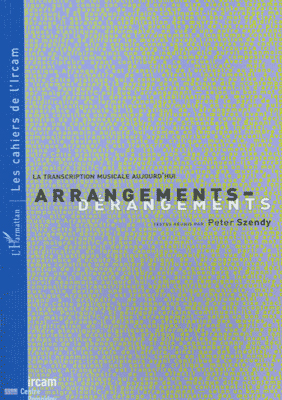Michael Jarrell
Les cahiers de l'Ircam
Today's composers:
How do they work? What do they express through their works? In an attempt to compensate for the lack of information about young composers and their music, Ircam, which hosts dozens of creators from around the world each season, is initiating a series of monographs. At the rhythm of three numbers per year, they follow the same basic format: the composer's personal point of view, a biography, an analysis of a representative work, and a catalogue.
Michael Jarrell, the leading young Swiss composer, began studying with Eric Gaudibert in Geneva, his native city, before going to Freiburg, Germany to complete his studies with his compatriot Klaus Huber. He resided in Paris between 1986 and 1988 (when initial contacts were made with Ircam), then in Rome from 1988 to 1990. Named composer in residence by the National Orchestra of Lyon in 1991, he now lives near Karlsruhe, Germany. In parallel, his compositional and research projects with Ircam are ongoing.
Summary
- Danielle Cohen-Lévinas, Entretien avec Michael Jarrell (Interview with Michael Jarrell)
- Danielle Cohen-Lévinas, Le même et le différent (The same and the different)
- Claude Hellfer, De l'interprétation (About Interpretation)
- Peter Szendy, Analyse de Congruences (An analysis of Congruence)
- Nicolas Vérin, Congruences et l'électronique (Congruence and electronics)
- Discography and catalogue of works by Michael Jarrell.
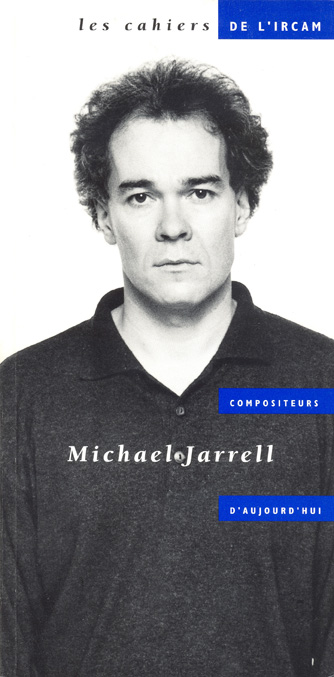
Les Cahiers de l'Ircam
Collection Compositeurs d'aujourd'hui
n°1, Paris, 1992, 87 pages
Revue Musicale de Suisse Romande
Galilée by Michael Jarrell
A troubling coincidence: the world premier of Michael Jarrell's opera Galilée, took place on January 25, 2006, several days away from the discovery of the first planet that, outside of our solar system, may have qualities similar to those of the Earth. Following the chamber opera Dérives in 1985, and the monodrama Cassandre in 1994, with Galilée, Michael Jarrell confirms his status as a force to be reckoned with in today's operatic world.
The musical style of Galilée shuns all retrospective references, asserting a pessimistic view of Bertolt Brecht's original work. By eliminating the carnival and plague scenes, the libretto, written by Jarrell himself, revolves around Galileo. His jovial side is erased giving more emphasis to his physical and intellectual decline. It is important to note the performance by Claudio Otelli: a remarkable stage presence (what a regard!), the Italian baritone incarnates an exceptional Galileo. The rest of the cast is in keeping. Note also that many of the singers actually dare to phrase, not limiting themselves to the purely technical performances so often typical in contemporary music. Only a lack of projection creates balance problems for some of them. Elzbieta Szmytka (Virginia, Galileo's daughter) offers a most expressive vibrato and Hans-Jürg Rickenbacher (the little monk) beautifully clear timbre and voicing. The Andrea (adult) proposed by Peter Bording is decisive and engaging. Another pleasant surprise come from the orchestra pit: the Orchestra of the Suisse Romande, more familiar with Brahms than with Boulez, demonstrated its worthiness by delivering a precise and careful performance, under the direction of Pascal Rophé.
Antoine Pecqueur
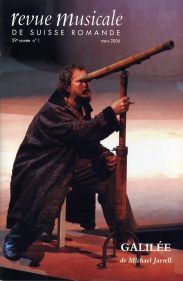
Revue Musicale de Suisse Romande
n°59-1, March 2006, 64 pages
Galilée
An opera in twelve scenes
Contrary to the structure of the play, with 15 well-defined scenes framed by frontispiece songs, Michael Jarrell conceived his opera as an uninterrupted flow of 12 scenes, attempting to capture the slightest nuances and developments of Brecht's various characters. His writing is not subject to a single and unique principle of composition, but endeavours to find an appropriate way to render every scene theatrical as well as musical, both in form and actual expressiveness. The orchestra thus elaborates textures, sometimes diaphanous, sometimes massive, with an extremely diversified treatment of the voice, from the driest speaking to the most lyrical singing, and certain superimpositions (of lines or of scenes) that help depict the often disorderly and excessive quality of reality, constantly extracting its intense musicality.
Summary
- Une mutation brechtienne (A Brecht Mutation), by Bernard Dort
- Au chœur de la « machine-opéra » (Within the « operatic-machine »), interview with Michael Jarrell
- Portrait du compositeur en artiste de son temps (Portrait of the composer as an artist of his own time), by Philippe Albéra
- The composer's libretto, after Bertold Brecht
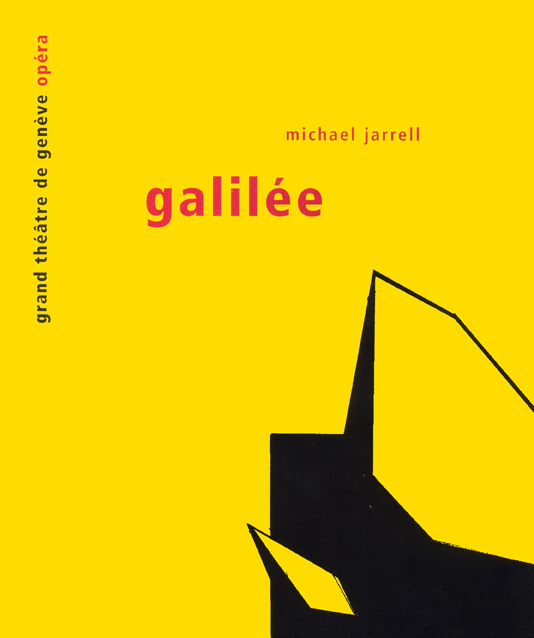
Grand théâtre de Genève
Program for the 2006-2006 season
Geneva, 2005, 94 pages
Arrangements - Derangements
Musical transcription today
To arrange is to transcribe: from the orchestra to the piano, from the piano to the orchestra, from one instrumental ensemble to another. This practice, which knew a « golden age » during the 19th century, has largely deserted the musical landscape considered as « contemporary ». Why? And why do some people continue to make arrangements all the same? It is that arranging deranges. It deranges the stabilization of works, their codification into canonical forms. Its position is one of rendering them malleable: flexible, deformable with regards to another listening experiences.
Michael Jarrell : L'orchestration comme art de mentir (Orchestration as the art of lying)
(concerning the Three Etudes by Debussy), pp. 105-116
Peter Szendy
Musique pour une fin de siècle (Music for the end of the century)
Interviews
These twenty interviews were made with Christophe Delz, Jean-Jacques Dünki, Roland Moser, Balz Trümpy, Williman Blank, Ulrich Gasser, Martin Derungs, Geneviève Calame, Sergio Menozzi, Renzo Rota, Francesco Hoch, Jacques Demierre, Pierre Thoma, André Richard, Michael Jarrell, Fritz Voegelin, Jean-Claude Schlaepfer, Jorge Pepi, Regina Irman, Mario Pagliarani. The interviews are followed by a short biography of each composer.
Jean-Pierre Amann
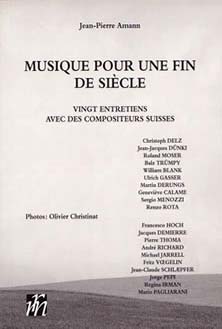
Revue Musicale de Suisse Romande
Special Edition, 1994, 135 pages
Ecritures musicales aujourd'hui (Music writing today)
Wagers
- Ecriture musicale et ordinateur : notes sur la genèse (Music writing and the computer: notes about the sources), Jean-Batiste Barrière
- L'écriture et ses mutations (Writing and its mutations), Célestin Deliège
Etudes
- Textes by Peter Szendy
Testimony
- Le texte et son pré-texte (The text and its pre-text), interview with Pierre Boulez.
- « Il n'y a jamais de si belle improvisation que longuement préparée », (« There is never so beautiful an improvisation as that prepared at length ») Interview with Claude Helffer. Peter Szendy
Unedited
- From Trei to Rhizomes. Unpublished manuscripts presented by Peter Szendy. Michael Jarrell
Chronicles
- The critical edition of Claude Debussy, François Lesure
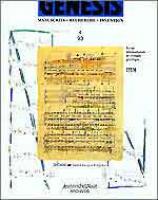
Genesis
Manuscrits - Recherche - Invention
Nr 4, July 1993, 135 pages
Revue Musicale de Suisse Romande
Portrait of Michael Jarrell
Born in 1958, Michael Jarrell recalls a happy childhood spent in what was for him « a little paradise »: Switzerland. The relationship that he maintains with his country is not apparent. « I feel Swiss, » he states unequivocally, evoking in reference certain compatriots such as Tinguely, Giacometti or Le Corbusier, with whom he feels incontestably close. Jarrell however regrets that « French-speaking Switzerland lives in the shadow of Paris, just as the German-speaking part does in relation to the Germanic countries, and even more so for Ticino with regards to Italy ». The perceptiveness of his analysis is no doubt due to the cosmopolitan character of his life experience. Before leaving to study in Freiburg with Klaus Huber, Jarrell attended the Conservatoire Populaire in Geneva. He justifies this iconoclastic choice by evoking the « anarchism » of the Conservatoire Supérieur during the 1970s. His composition teacher, Eric Gaudibert, remembers him as a student who « stood out due to his personality » and still remembers one of his Spanish style scores, « without accidentals », in particular. The composer hailing from Vevey still evokes those « economically challenging years » which prompted him to explore several unusual disciplines, among which was group improvisation...
Antoine Pecqueur
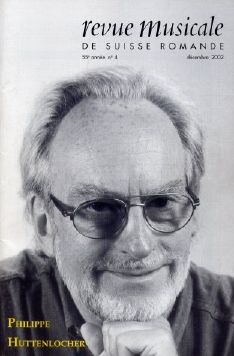
Revue Musicale de Suisse Romande
n°55-4, December 2002, 56 pages

